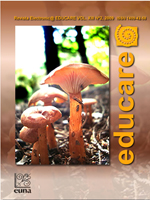Transición 6 grado a 7año, ¿problema o desafío?
DOI:
https://doi.org/10.15359/ree.13-2.8Keywords:
adolescence, transition, elementary school, high school, success, factorsAbstract
The present article displays the results of a two-year research experience carried out by an interdisciplinary research team from the five academic departments (units) at CIDE. The study is part of a larger research project named Profiles, Dynamics and Challenges of Costa Rican education at CIDE, which is directed by the Deanery.
The study was conducted during 2006 and part of 2007 in secondary schools which were identified as successful institutions regarding academic achievements. The research focused on exploring the factors which influence students’ academic performance positively as they move from primary to secondary school and as they remain within successful academic indicators during those transition years.
This research, besides involving an important literature review, required field work which took place in ten secondary schools from diverse settings all over the country. Observations were made and the seventh and eighth graders’ beliefs, as well as, their parents’ and teachers’ assumptions were explored. In addition, paralleled to the aspects mentioned, an important population of sixth grade students, their parents, and teachers were studied, since those primary institutions were related to the secondary schools involved in the study.
References
Antúnez, S. (2005). El cuido de los procesos de transición de primaria a secundaria: a modo de
balance. Aula de Innovación Educativa, 142, 7-11.
Bolaños, G. y Molina, Z. (2001). Introducción al currículo. San José, Costa Rica: Editorial
Universidad Estatal a Distancia.
Dengo, M. E. (1995). Educación costarricense. San José, Costa Rica: Editorial Universidad Estatal
a Distancia.
Gimeno Sacristán, J. (1997). La transición a la educación secundaria: discontinuidades en las
culturas escolares. Madrid, España: Ediciones Morata.
Greenberg, M. & Gold, M. (1999). Close and General Friendships among African American,
Latino, and Asian American Adolescents from Low-Income Families. Recuperado el 30 de
marzo del 2006, de http://spr.sagepub.com/cgi/content/abstract/18/1/29
Kirkpatrick, D. (1997). Making the Change: Students Experiences of the Transition to Primary
School. University of Western Sydney. Centre for Learning and Teaching, University of
Technology, Sydney. Recuperado el 15 de marzo de 2006, de http//edoz.com.au/educationaustralia/archive/features/make.html
Luján, M. (2000, Octubre). Educación y valores democráticos. Foro Iberoamericano sobre educación
en valores. Ministerio de Educación y Cultura, Organización de Estados Iberoamericanos.
Recuperado el 20 de junio de http://www.oei.es/valores2/tornaria.htm
Mizelle, N. (1999). Helping Middle School Students Make the Transition into High School.
Clearinghouse on Elementary and Early Childhood Education. (Nº De servicio de reproducción
de documentos ED432411).
Nieda, J. & Macedo, B. (1997). Un currículo científico para estudiantes de 11 a 14 años. Biblioteca
Virtual de la Organización de Estados Iberoamericanos (OEI). España. Recuperado el 20 de
junio de 2006 de http://www.oei.org.co/oeivirt/curricie/index.html
Ruiz, A. (2006). Universalización de la Educación Secundaria y reforma educativa. San José,
Costa Rica: Editorial Universidad de Costa Rica/CONARE.
San Fabián, J. (2003). Coordinación entre primaria y secundaria ¡Ojo al escalón! 1 Jornada sobre
el tránsit de l’alumnat entre etapes educatives: de l’escola a l’institut Palma de Mallorca.
Recuperado el 15 de abril de 2006 de http://weib.caib.es/Documentacio/jornades/jornada_
transicio/article_jlsf.pdf
Seaton, M., Egliston, K., Marsh, H., Franklin, J. & Craven, R. (2004). Social Comparison: Its Role
in the Big-Fish-Little-Pond Effect. SELF Research Centre, University of Western Sydney,
Australia. Recuperado el 30 de marzo de 2006, de http://self.uws.edu.au/Conferences/2004_
Seaton_Egliston_Marsh_Franklin_Craven.pdf
Tonkin, S. & Watt, H. (2003). Self-concept over the Transition from Primary to Secondary School:
A Case Study on a Program for Girls. Educational Research 13(2) Recuperado el 30 de mayo
del 2006, de http://www.iier.org.au/iier13/tonkin.html
Downloads
Published
How to Cite
Issue
Section
License
1. In case the submitted paper is accepted for publication, the author(s) FREELY, COSTLESS, EXCLUSIVELY AND FOR AN INDEFINITE TERM transfer copyrights and patrimonial rights to Universidad Nacional (UNA, Costa Rica). For more details check the Originality Statement and Copyright Transfer Agreement
2. REUTILIZATION RIGHTS: UNA authorizes authors to use, for any purpose (among them selfarchiving or autoarchiving) and to publish in the Internet in any electronic site, the paper´'s final version, both approved and published (post print), as long as it is done with a non commercial purpose, does not generate derivates without previous consentment and recognizes both publisher's name and authorship.
3. The submission and possible publication of the paper in the Educare Electronic Journal is ruled by the Journal’s editorial policies, the institutional rules of Universidad Nacional and the laws of the Republic of Costa Rica. Additionally, any possible difference of opinion or future dispute shall be settled in accordance with the mechanisms of Alternative Dispute Resolution and the Costa Rican Jurisdiction.
4. In all cases, it is understood that the opinions issued are those of the authors and do not necessarily reflect the position and opinion of Educare, CIDE or Universidad Nacional, Costa Rica. It is also understood that, in the exercise of academic freedom, the authors have carried out a rogorous scientific-academic process of research, reflection and argumentation thar lays within the thematic scope of interest of the Journal.
5. The papers published by Educare Electronic Journal use a Creative Commons License:

















 The articles published by Educare Electronic Journal can be shared with a Creative Commons License:
The articles published by Educare Electronic Journal can be shared with a Creative Commons License: 



